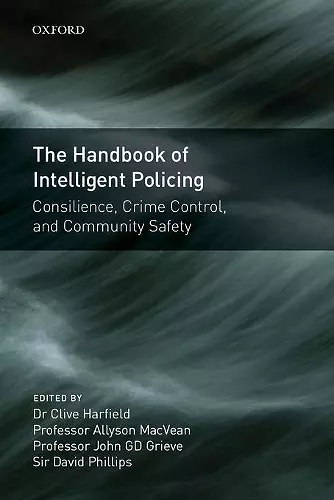Handbook of Intelligent Policing
Consilience, Crime Control, and Community Safety
Phillips editor Harfield editor Grieve editor MacVean editor
Format:Paperback
Publisher:Oxford University Press
Published:28th Aug '08
Currently unavailable, and unfortunately no date known when it will be back

In the last twenty-five years, there has been a growing awareness of the role of intelligence within law enforcement activity. This edited volume on intelligence is the first of its kind to draw together in one volume scholarly and practical perspectives on intelligence in policing. In a range of essays from leading experts and practitioners, this book sets out the main concepts and philosophies behind the practical framework for intelligence gathering and analysis in UK policing. The book's four Editors bring a wealth of experience and knowledge to bear upon the subject matter: Sir David Phillips and Professor John Grieve were instrumental in developing and defining the role of intelligence in English policing; Dr Clive Harfield has operational experience managing an intelligence unit and was a national intelligence officer; and Professor Allyson MacVean has practical experience working with the police on issues of dangerous offender management and community impact assessments. The emphasis on intelligence for the purposes of policing has been expressed theoretically in 'intelligence-led policing'; a mantra repeated by both politicians and senior police officers and suggesting that intelligence is the universal panacea for all ills - from national security to creating safer neighbourhoods. This expression betrays both the potential sophistication of intelligence and the very real implementation problems that practitioners encounter daily. This volume seeks to address these complexities through its discussion of how intelligence has been conceptualised and developed into practical products for the purposes of policing as undertaken not only by the police, but also by partner agencies and other providers. Divided into four parts, each section of the book begins with a comprehensive overview of the topic written by the Editors. The Editors pose a series of questions which are explored further by expert contributors in a series of essays, each one an important contribution to the treatment of intelligence in policing today. Part One looks at the history and theory of intelligence in policing, reflecting on how the police service arrived at its current approaches to intelligence; Part Two deals with analysis, examining the police relationship with analysts and the various models of analysis; Part Three looks at partnership with other agencies (prisons/local authorities) and draws on case studies to explore how different frameworks can be structured; and Part...
ISBN: 9780199533121
Dimensions: 234mm x 156mm x 21mm
Weight: 527g
340 pages